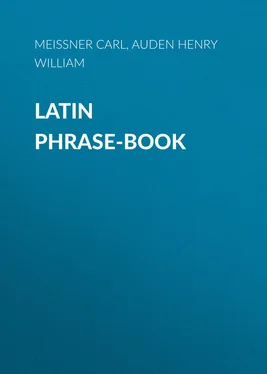Carl Meissner - Latin Phrase-Book
Здесь есть возможность читать онлайн «Carl Meissner - Latin Phrase-Book» — ознакомительный отрывок электронной книги совершенно бесплатно, а после прочтения отрывка купить полную версию. В некоторых случаях можно слушать аудио, скачать через торрент в формате fb2 и присутствует краткое содержание. Жанр: foreign_antique, foreign_prose, на латинском языке. Описание произведения, (предисловие) а так же отзывы посетителей доступны на портале библиотеки ЛибКат.
- Название:Latin Phrase-Book
- Автор:
- Жанр:
- Год:неизвестен
- ISBN:нет данных
- Рейтинг книги:5 / 5. Голосов: 1
-
Избранное:Добавить в избранное
- Отзывы:
-
Ваша оценка:
- 100
- 1
- 2
- 3
- 4
- 5
Latin Phrase-Book: краткое содержание, описание и аннотация
Предлагаем к чтению аннотацию, описание, краткое содержание или предисловие (зависит от того, что написал сам автор книги «Latin Phrase-Book»). Если вы не нашли необходимую информацию о книге — напишите в комментариях, мы постараемся отыскать её.
Latin Phrase-Book — читать онлайн ознакомительный отрывок
Ниже представлен текст книги, разбитый по страницам. Система сохранения места последней прочитанной страницы, позволяет с удобством читать онлайн бесплатно книгу «Latin Phrase-Book», без необходимости каждый раз заново искать на чём Вы остановились. Поставьте закладку, и сможете в любой момент перейти на страницу, на которой закончили чтение.
Интервал:
Закладка:
Henry William Auden
Latin Phrase-Book
PREFACE
Although, ideally speaking, a phrase-book should always be compiled by the pupil himself from his own individual observation, yet in these days, when an extended curriculum tends to curtail considerably the amount of Latin read, it seems to me that anything which may help boys to some knowledge of Latinity in a short time is not wholly useless. Hence this translation. The use of such books as Meissner's Phraseologie involves no new and untried principles, witness the excellent results obtained in Germany, where the book has passed through six editions. It has also been translated into French (the translation is now in its third edition) and Italian.
My best thanks are due to Professor Meissner for his courtesy in allowing me to make this translation, also to Professor Pascal of Reims, to whose admirable translation I am much indebted.
H. W. AUDEN.
FETTES COLLEGE, EDINBURGH,
1894
I. The World and Nature
1. The World – Creation
rerum or mundi universitas – the universe.
rerum natura or simply natura – creation; nature.
haec omnia, quae videmus – the visible world.
totius mundi convenientia et consensus – the perfect harmony of the universe.
deus mundum aedificavit, fabricatus est, effecit (not creavit ) 1 1 Creare is usually employed in the sense of producing, originating, causing, e.g. similitudo creat errorem; periculum alicui creare . It has, however, occasionally the meaning to create, e.g. De Fin. rerum quas creat natura.
– God made the world.
deus est mundi procreator (not creator ), aedificator, fabricator, opifex rerum – God is the Creator of the world.
elementa; initia or principia rerum – the elements.
elementa et tamquam semina rerum – the elements and first beginnings.
nutus et pondus or simply nutus ( ῥοπή ) – gravity.
2. The Earth and its Surface
orbis terrae, terrarum 2 2 To the Romans orbis terrarum (more rarely orbis terrae ) meant all those countries which made up the Roman Empire.
– the earth; the globe
(terra) continens (B. G. 5. 8. 2) – the continent.
terra (regio) mediterranea – an inland region; the interior.
interior Asia; interiora Asiae – the interior of Asia.
sinus urbis (Sall. Cat. 52. 35) – the heart of the city.
in ipsam or intimam Graeciam penetrare – to penetrate into the heart of Greece.
terra effert (more rarely fert , 3 3 ferre is also used metaphorically, to produce, e.g. haec aetas perfectum oratorem tulit (Brut. 12. 45).
but not profert ) fruges – the earth brings forth fruit, crops.
terra fundit fruges – the earth brings forth fruit abundantly.
animata (animalia) inanimaque (not inanimata ) – animate and inanimate nature.
ea, quae terra gignit – the vegetable kingdom.
ea, quae e terra gignuntur – the vegetable kingdom.
ea, quae a terra stirpibus continentur – the vegetable kingdom.
ea quorum stirpes terra continentur (N. D. 2. 10. 26) – the vegetable kingdom.
arbores stirpesque, herbae stirpesque (De Fin. 5. 11. 33) – the vegetable kingdom.
radices agere (De Off. 2. 12. 73) – to take root.
gemmas agere – to bud, blossom.
gemmae proveniunt – the trees are budding.
arbores frondescunt – the trees are coming into leaf.
rami late diffunduntur – the twigs are shooting out, spreading.
montes vestiti silvis – wooded hills.
summus mons – the top of a mountain.
culmina Alpium – the summits of the Alps.
sub radicibus montis, in infimo monte, sub monte – at the foot of the mountain.
superare Alpes, Pyrenaeum, Apenninum 4 4 But Pyrenaei montes, saltus occur (B. G. 1. 1. 7; B.C. 1. 37. 1).
(both always in the sing.) – to cross the Alps, Pyrenees, Apennines.
altissimis montibus undique contineri – to be shut in on all sides by very high mountains.
prospectus est ad aliquid – one has a view over…; one is able to see as far as…
collis leniter ab infimo acclivis (opp. leniter a summo declivis ) – a gentle ascent.
ad extremum tumulum – on the edge of the hill.
loca edita, superiora – heights, high ground.
loca aspera et montuosa (Planc. 9. 22) – rough and hilly ground.
loca plana or simply plana – level country; plains.
saxa praerupta – steep rocks.
loca inculta – uncultivated districts.
loca deserta (opp. frequentia ) – deserts.
loca amoena, amoenitas locorum – pleasant districts; charming surroundings.
3. Water – Rivers – Sea
summa aqua – the surface of the water.
ex aqua exstare – to stand out of the water.
aqua est umbilīco tenus – the water reaches to the waist.
aqua pectus aequat, superat – the water is up to, is above, the chest.
(se) ex aqua emergere 5 5 Also used metaphorically, e.g. (se) emergere ex malis (Nep. Att. 11. 1) to recover from misfortune. So emergere e fluctibus servitutis (Harusp. Resp. 23. 48).
– to come to the surface.
aquam ex flumine derivare – to draw off water from a river.
aquam ducere per hortum – to bring a stream of water through the garden.
aquae ductus (plur. aquarum ductus ) 6 6 aquae ductio = the action, process of drawing off the water; canalis = the water-pipe, channel, conduit.
– a conduit; an aqueduct.
agros irrigare – to irrigate fields.
aqua viva, profluens (opp. stagnum ) – running water.
aqua iugis, perennis – a perpetual spring.
frigidā, calidā lavari (Plin. Ep. 3. 5. 11) – to take a cold, warm, bath.
aquae, aquarum inops – ill-watered.
fluctuare or fluctuari – driven by the waves.
fluctibus iactari – tossed hither and thither by the waves.
fluctibus (undis) obrui , 7 7 So metaphorically, aere alieno obrutum esse , to be over head and ears in debt; nomen alicuius obruere perpetua oblivione , to drown a person's name in oblivion.
submergi – to be engulfed.
gurgitibus hauriri – to be drowned in the eddies.
flumen citatum fertur – the rivers flows with a rapid current.
flumen imbribus auctum – a river swollen by the rain.
flumen super ripas effunditur – the river is over its banks, is in flood.
flumen extra ripas diffluit – the river is over its banks, is in flood.
flumen agros inundat 8 8 Inundation = eluvio , not inundatio which is post-classical.
– the river floods the fields.
flumen vado transire – to wade across, to ford a river.
flumine secundo – with the stream; downstream.
flumine adverso – against the stream; upstream.
Rhenus oritur or profluit ex Alpibus – the Rhine rises in the Alps.
Читать дальшеИнтервал:
Закладка:
Похожие книги на «Latin Phrase-Book»
Представляем Вашему вниманию похожие книги на «Latin Phrase-Book» списком для выбора. Мы отобрали схожую по названию и смыслу литературу в надежде предоставить читателям больше вариантов отыскать новые, интересные, ещё непрочитанные произведения.
Обсуждение, отзывы о книге «Latin Phrase-Book» и просто собственные мнения читателей. Оставьте ваши комментарии, напишите, что Вы думаете о произведении, его смысле или главных героях. Укажите что конкретно понравилось, а что нет, и почему Вы так считаете.

![Рис Хьюз - Madonna Park[e-book - рассказы]](/books/94285/ris-hyuz-madonna-park-e-book-rasskazy-thumb.webp)










